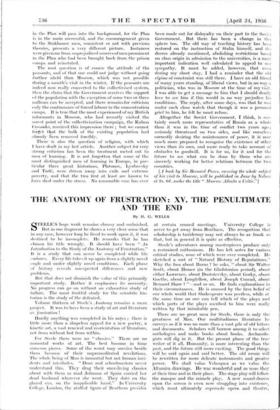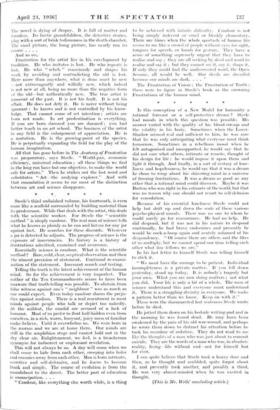THE ANATOMY OF FRUSTRATION: XV. TILE PENULTIMATE AND THE END
By H. G. WELLS
STEELE'S huge work remains clumsy and unfinished. But in one fragment he shows a very clear sense that in any case, however long he lived to work upon it, it was destined to be incomplete. He remarks that he has chosen his title wrongly. It should have been " Introduction to the Study of the Anatomy of Frustration." It is a study that can never be completed while life endures. Every life takes it up again from a slightly novel angle and under slightly novel conditions. Each phase of history reveals unexpected differences and new problems. • But that does not diminish the value of this primarily important study. Rather it emphasises its necessity. No progress can go on without an exhaustive study of failure. The most fruitful study for the scientific his- torian is the study of the defeated.
Volume thirteen of Steele's Anatomy remains a mere Project. It was to have been a study of art and literature ji-ustration!
Hardly anything was completed in his notes ; there is little more than a shapeless appeal for a new poetry, a kinetic art, a vast renewal and reorientation of literature, not front without but from within.
• For Steele there were no "classics." There are no immortal works of art. The best become in time museum pieces. Some of the worst may survive beside them because of their unpremeditated revelations. The whole being of Man is immortal but not human inci- dents and interludes. "Dons and schoolmasters never understand this. They drag their once-living Classics about with them as mad Johanna of Spain carried her dead husband wherever she went. They dote on the glazed eye, on the inapplicable hand." In 'University College, London, the stuffed figure of Bentham presides at certain council meetings. University College is never to get away from Bentham. The recognition that scholarship is taxidermy may not always be as frank as that, but in general it is quite as effective.
Steele's adventures among masterpieces produce only a restrained enthusiasm. He has left notes for various critical studies, none of which were ever completed. He sketched a sort of "Natural History of Reputations." Why the fuss about Burns ? he asks, "about Sir Walter Scott, about Homer (in the Gladstonian period), about either Lawrence, about Dostoievsky, about Gorky, about Goethe, about Longfellow, about Joseph Conrad, about Bernard Shaw ? "—and so on. He finds explanations in their circumstances. He is amused by the firm belief of our whole world that Shakespeare was peerless, while at the same time no one can tell which of the plays and which parts of the plays ascribed to him were really written by that inimitable pen.
There are no great men for Steele, there is only the greatness of Man. Our multitudinous literature he surveys as if it was no more than a vast pile of old letters and documents. Scholars will burrow among it to select anthologies and make books about books. Archaeolo- gists will dig in it. But the present phase of the true writer of it all, Humanity, is more interesting than the past, and the future still more exciting. The good things will be said again and said better. The old music will be rewritten for more delicate instruments and greater power. We shall value Velasquez as we value the Altamira drawings. He was wonderful and so were they at their time and in their place. The stage play will follow the masque and the miracle play. A new sound-drama upon the screen is even now struggling into existence, which must ultimately supersede opera and theatre. The novel is dying of dropsy. It is full of matter and formless. Its hectic grandchildren, the detective stories, play with a sort of brisk tediousness in the death chamber. The easel picture, the hung picture, has nearly run its course . . . .
And so on.
Frustration for the artist lies in his envelopment by tradition: He who imitates is lost. He -who repeats is lost. He who "rebels " consciously and shapes his work by avoiding and contradicting the old is lost. Here more than anywhere, what is done must be new —not extravagantly and wilfully new, which indeed is not new at all, being no more than the negative form of the .old—but authentically new. The true artist is innocent- of the past. It is not his fault. It is not his affair. He does not defy it. He is naive without being ignorant ; he knows and is not controlled by his know- ledge. That cannot come of set intention ; artists are born not made. In art predestination is everything. If you are born damned you are damned ; you had better teach in an art school. The business of the artist in any field is the enlargement of appreciation. He" is a mutation. He is the growing-point of the species. He is perpetually expanding the field for the play of the human imagination.
All that has gone before in The Anatomy of Frustration was preparatory, says Steele. "World-pax, economic efficiency, universal education ; all these things we find in the long run have but one objective, to make the world safe for artists." Then he strikes out the last word and substitutes "Art—the undying explorer." And with that emendation it seems to me most of the distinction between art and science disappears.
*__ Steele's third unfinished volume, his fourteenth, is even more like a scaffold surrounded by building material than its predecessor. While that deals with the artist, this deals with the scientific worker. For Steele the "scientific method "is simply candour. The real man of science tells what he knows as plainly as he can and listens for any jar against fact. He searches for these discords. Wherever a jar is detected he adjusts. The progress of science is the exposure of inaccuracies. Its history is a history of frustrations admitted, examined and overcome.
Essentially science is candour. What is the scientific method ? Bare, cold, clear, sceptical observation and then the utmost precision of statement. Continual re-exami- nation of the statement. Incessant search and testing. • Telling the truth is the latest achievement of the human mind. So far the achievement is very imperfect. The author of the Ten Commandments seems to have been unaware that truth-telling was possible. To abstain from false witness against one's " neighbour " was as much as one could expect. Even today candour shares the preju- dice against nudism. There is a real resentment in most minds against people who talk or depict too nakedly. At the mildest, the candid are accused of a lack of humour. Most of us prefer to float half-hidden even from ourselves, in a rich, warm, buoyant, juicy mess of familiar make-believe. Until it overwhelms us. We were born in the morass and we are at home there. Our minds are still in the amphibian stage and cannot hold out in the dry clear air. Enlightenment, we feel, is a treacherous synonym for indiscreet or unpleasant revelation.
This will not always be so. A day will come when we shall cease to hide from each other, creeping into holes and. crannies away from each other. Man is born intricate, secretive and self-defensive, and he learns to become frank and simple. The course of evolution is from the roundabout to the direct. The better part of education is emancipation. . . .
"Candour, like everything else worth while, is a thing to be achieved with infinite difficulty. Candour is not being simply indecent or cruel or bleakly elementary. There are times when the whole spectacle of human life seems to me like a crowd of people without eyes for sight, tongues for speech, or hands for gesture. They have ii sense of something Supremely urgent that they have to realise and say ; they are all seeking by deed and word to realise and say it ; but they cannot see it. Nay it, shape it. If only they could find the undiscovered word, the Open Sesame, all would be well. Our deeds are dreadful because our minds are dark. .
The Frustration of Vision ; the Frustration of Truth these were to figure in Steele's book as the crowning Frustrations of the human mind.
Is this conception of a New Model for humanity a rational forecast or a self-protective dream ? Steele had moods in which this question was possible.
.answer varied with the quality of his blood-stream and the vitality in his body. Sometimes when the Lover- Shadow seemed real and sufficient to him, he was sure that he was only anticipating what everyone must think tomorrow. Sometimes in a rebellious mood when la, felt antagonised and unsupported, he would say that he did not care what others, intimate or remote, thought of his design for life ; he would impose it upon them and fight it through. And finally, in a sort of ecstasy of lone- liness and hopelessness, he would say that it was a dream he chose to wrap about his shivering mind in a universe of freezing frustrations. It was a dream as good as any other that a rational mind could discover. Maybe it was Burton who was right in his estimate of the world, but that was no reason why one should not resort to self-delusion for consolation.
Because of his essential loneliness Steele could not help but drift up and down the scale of these various psycho-physical moods. There was no one to whom he could surely go for reassurance. Ile had no help. Ile did despond, but it was not in his nature to despond continually, he had brave endocrincs and presently he would be cock-a-hoop again and acutely ashamed of his despondency. "Of course there are others and the likes of us multiply, but we cannot spend our time telling each other what fine fellows we are."
In his last letter to himself Steele was telling himself to stick it.
"We must have the courage to be patient. Individual incompleteness is a private matter. If you fell down yesterday, stand up today. It is nobody's tragedy but your own. What you are now doing matters ; not what you did. Your life is only a bit of a whole. The men of science understand this and everyone must understand it. There is a struggling divinity in everyone. We make a pattern better than we know. Keep on with it."
These were the disconnected last sentences Steele wrote before he died.
He jotted them down on his bedside writing-pad and in the morning he was found dead. He may have been awakened by the pain of his old war-wound, and perhaps he wrote them down to distract his attention before he took his overdose of sedative. They do not read to me like the thoughts of a man who was just about to commit suicide. They are the words of a man who was, in absolute reality, living—life without end—not for himself but for ever.
I can quite believe that Steele took a heavy dose and then, as he thought and scribbled, quite forgot about it, and presently took another, and possibly a third, He was very absent-minded when he was excited in thought.
(This is Mr. Wells' concluding article.)



















































 Previous page
Previous page